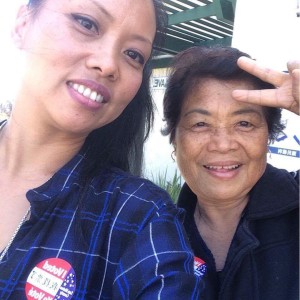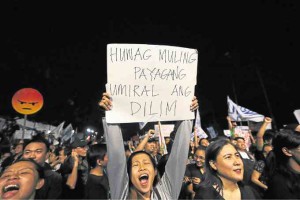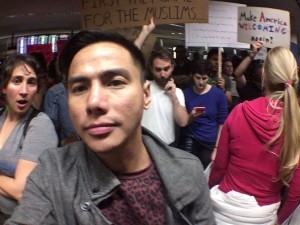Young Fil-Ams close ranks with veteran activists in trying times

Ruth De Leon Gemora and her mother Doris, two generations of anti-dictatorship activists. CONTRIBUTED
SAN FRANCISCO – Late last year, in a stunning show of defiance, thousands of Filipino millennials in the Philippines took to the streets to protest the secret burial of Ferdinand Marcos in the Libingan ng mga Bayani (Heroes Cemetery).
Students and other anti-dictatorship activists from all over the country showed their disgust at what they saw as a conscious move by the President Rodrigo Duterte and the Marcos family to revise history by legitimizing the 14-year dictatorial rule of Marcos.
Filipinos overseas from Hongkong to France to Germany to the Middle East to the United States also rallied around their compatriots, showing to the world that the anti-dictatorship and pro-democracy movement in the Filipino diaspora was alive and well. In these protests, too, Filipino millennials stepped forward to close ranks with activists from an older generation, some of whom are their parents.
Instant political primer
Two weeks before the Marcos sneak-burial, the Supreme Court, in a 9-5 decision, had approved Duterte’s order to give hero’s honors to the dictator, despite the moving testimonies by martial law victims, and weeks of huge demonstrations. To the government and the Marcos family’s chagrin, the Marcos burial became an instant political primer among the youth about the dictatorship years. Students as young as grade school girls at Saint Scholastica’s College to high school and college students from different universities protested the burial with a militancy reminiscent of the youth activists in the 1970s.
Across the Pacific, Filipino Americans in the San Francisco-Bay Area, known as the epicenter of the ant-Marcos dictatorship in the 1970s and 1980s, organized a series of protests in front of the Philippine Consulate to stop the burial of Marcos at LNMB. Led by veteran community activists of the Filipino American Human Rights Alliance (FAHRA), these actions attracted a new generation of Filipino Americans, including those who were still children during martial law or who were born after the ouster of Marcos in 1986.

Millennials protesting in Manila against the sneak-burial of dictator Marcos as a hero. INQUIRER FILE
Mercedes, a millennial who works for a San Francisco tech company, came to the November 30 FAHRA protest, the first she has ever joined in the U.S., at her mother’s behest. “My mom called me last night and encouraged me to participate in this action. She felt it was important for Filipinos worldwide to oppose the Marcos burial at LNMB, a grave insult to the memory of those who suffered or died during the martial law era under Marcos.”
Growing political clout
When Ferdinand “Bongbong” Marcos Jr. almost won the election for Vice President in May 2016, the attention of many political analysts turned towards the Filipino millennials, aged 18 to 34. This demographic group, said to comprise about 40% of voters, became the subject of much debate. Their supposed lack of knowledge about martial law was seen as an advantage for Marcos, who actively propagated a revisionist history about his father’s rule during the campaign, calling it the “golden age” in Philippine history.
Some disagreed and asserted that it was actually the older voters who showed strong support for Marcos. Others thought that the failure of post-1986 governments to require the study of martial law period in schools was one of the main reasons for the lack of awareness among the youth about the Marcos dictatorship.
What became clear from the debate, however, was that young Filipinos have the tremendous potential of influencing future elections and the political direction of the country because of their sheer numbers.
“The Marcos dictatorship was not a part of our curriculum in high school but it was discussed in college,” Mercedes related. Her knowledge about martial law further increased when she moved to the U.S. and she attended a seminar on financial fraud, where they discussed kleptocracy. “Naturally, Marcos was on the list of kleptocrats. It is unfortunate that not too many people in the Philippines are aware that Filipinos are paying to this day the debts incurred under Marcos and will continue to do so until 2025.”
Wake-up call
Marcos Jr.’s election performance became a wake-up call for former anti-dictatorship activists and served as a springboard for intense debate and education about martial law on mainstream media, social media, in schools, and cultural performances. The People Power Revolution’s 30th anniversary commemorative events in February 2016 further increased the awareness of the youth as the media featured extensively the survivors’ accounts of the horrors of the Marcos regime.
The EDSA People Power Commission opened an interactive experiential museum at Camp Aguinaldo, allowing visitors to witness life under martial law by visiting ten halls that creatively combined theatre, cinema and photography to highlight corruption, human rights abuses, and the torture and murders of activists during the Marcos era. The exhibit ran for only two days but became a powerful indictment of the dictatorship and an effective Martial Law 101 for millennials. The Bantayog ng mga Bayani (Monument to Martyrs and Heroes of Martial Law) also organized a series of events to mark the historic anniversary of the ouster of Marcos.
During the election campaign period last year, Susan Quimpo and four other members of her group, Martial Law Chronicles Project, spoke at 27 schools in Zamboanga, Iloilo, Cebu, Iligan, Cagayan De Oro, Baguio, Pangasinan, and Metro Manila, reaching about 12,000 students in two and a half months.
Quimpo, the co-author and co-editor of Subversive Lives: A Family Memoir of the Marcos Years, shared with students her personal experiences of as a member of a family of activists that lost two sons under martial law. (The Ohio University Press has published the international edition of her much-acclaimed book, and the author will begin a speaking tour in the U.S. starting February.)
Quimpo’s message to her young audiences was succinct: educate yourselves on martial law and fight the falsehoods being propagated by “trolls” on social media.
Power of social media, memory
There is no doubt that social media, because of its massive popularity, is now part and parcel of the life of billions of people worldwide. It is estimated that the Philippines, whose population is at over 100 million, has over 44 million Internet users and 90% of these Filipinos have social media accounts. Facebook has reported that about 22 million Filipinos engaged in conversations on Facebook about the 2016 elections. Thus, social media has become the battlefield for the hearts of minds of the millennials, where they are exposed to many sites aggressively promoting historical revisionism vis-à-vis the Marcos years.
Like other young Fil-Ams, Mercedes gets her news through Facebook, Twitter, and Rappler, as well as from family and friends. She is well informed about martial law because she listened to the stories of her parents, who had joined protest rallies when they were in college and later as parents of young children. “I grew up hearing about the excesses of Imelda and her shopping sprees in New York while spending government funds. I saw a documentary on the construction workers who died while rushing to finish the film center for the first Manila Film Festival, a project of Imelda. I learned about how Marcos and his cronies appropriated funds from the sugar industry, sequestered companies and utilities and enriched themselves in the process.”
Like Mercedes, Ruth De Leon Gemora, who calls herself a member of Generation X, also attended her first protest about the Philippines on November 30. “I decided to join my uncle Donny, who’s a member of FAHRA, because I’ve been watching the news about President Duterte. His order to kill as many drug users and sellers as possible without giving them a chance to prove their innocence in court reminded me so much of Marcos. His decision to bury Marcos as a hero was a slap in the face of all those people who have lost a loved one, were criminalized for their opposition to the dictatorship, or raped by Marcos’ men during his reign.”
Triggered memories
A mother of two teenagers and working as a marketing manager for a travel club and choreographer-owner of a dance and fitness class in San Francisco, De Leon Gemora keeps up with the news from many sources, from mainstream to social media. The FAHRA action in front of the Philippine Consulate triggered her memories of the People’s Power Revolution. She was only in third grade at the time and her parents were deeply involved in social activism in the Philippines.
“My parents taught me about the words ‘democracy’ and ‘corruption’ at a very young age. During the snap election between Marcos and Cory Aquino, my father was in charge of contacting U.S. journalists to help protect the vote, and my mother bravely strapped voter ballots on her body and marched to the town of Concepcion, Tarlac. Though a human shield of protestors who carried sticks surrounded her, it would not have been enough to defend them against the heavily armed military men who followed them.”
Also at the same FAHRA protest, Jethro Patalinghug, a filmmaker and video producer, shared the pain he suffered in getting separated from his mother, an organizer in Cebu during martial law, who had to flee the country because her comrades in the movement were getting killed one by one.

Jethro Patalinghug at SFO protest against President Trump’s travel ban also opposes President Duterte’s efforts to undermine Philippine democracy. CONTRIBUTED
“My mother left her children behind, and she and I did not see each other for 18 years.” Patalinghug megged “My Revolutionary Mother,” as an homage to his mother Virginia’s activism and their emotional path towards reconciliation, which has received numerous awards at film festivals.
Challenging times for Fil-Am activists
With the election of politically conservative Donald Trump, young Fil-Am activists are now facing challenges on two fronts. In the U.S., Trump, who ran on an anti-immigrant and far right platform, has unleashed several executive orders, including one that threatens the democratic rights of immigrant and refugees. Not only are they worried about their future in this country, but also they are deeply concerned about the repressive policies of President Duterte, whose bloody war on drugs has already resulted in 7,000 casualties during his first seven months in office.
In addition, Duterte has also advocated for the return of the death penalty, persecuted members of the opposition, supported lowering the minimum age of criminal liability from 15 to 9, and shown partiality to Marcos in his efforts to unseat duly elected Vice President Leni Robredo.
De Leon Gemora relates, “I marched with my mother last year to support the “Black Lives Matter” protest happening in San Francisco. After Duterte’s decision to bury Marcos as a hero, I was inspired to do something about the Philippines because I felt that I was doing a lot of people justice by standing up against dictators. My mother Doris taught me a lot about fighting for those who do not have a voice or choice. She was diagnosed recently with the early stages of Alzheimer, and I want her to know that I’m standing on behalf of her fight for the injustices done against our people. It’s my turn to stand up and speak up for her.”
Living testament
Patalinghug believes that Duterte is stepping on the sacrifices of the many who have fought against the Marcos dictatorship and clearly undermining democracy, as in the case of extrajudicial killings.

Mercedes (left) and Ruth De Leon Gemora at FAHRA’s November 30 protest, denouncing hero’s burial for dictator Marcos. INQUIRER/ Mila De Guzman
“I am a living testament as to how families suffer in the midst of political turmoil that happens in any country,” Patalinghug stated. “My mother’s work as a political activist during martial law deprived me of a mother for almost two decades, and now only to be threatened again with the same separation under the Trump administration because I’m a green card holder. Trump’s executive order on immigration is an inhuman, immoral and illegal act and should be stopped and fought in every capacity.”
Mercedes, who joined the recent Women’s March opposing Trump’s policies against women and other groups, feels strongly that she has a role to play in the U.S. to support the struggles in the Philippines.
“My mother inspired me to join the protest against the burial of Marcos because she believes that overseas Filipinos could amplify to a wider arena the voices of those back home. I think that since we are the next generation to assume the mantle, we should never forget the atrocities committed against our people in the past so we do not commit the same mistakes in the future. I believe that remembering our history, no matter where we are in the world, helps us move forward.”

